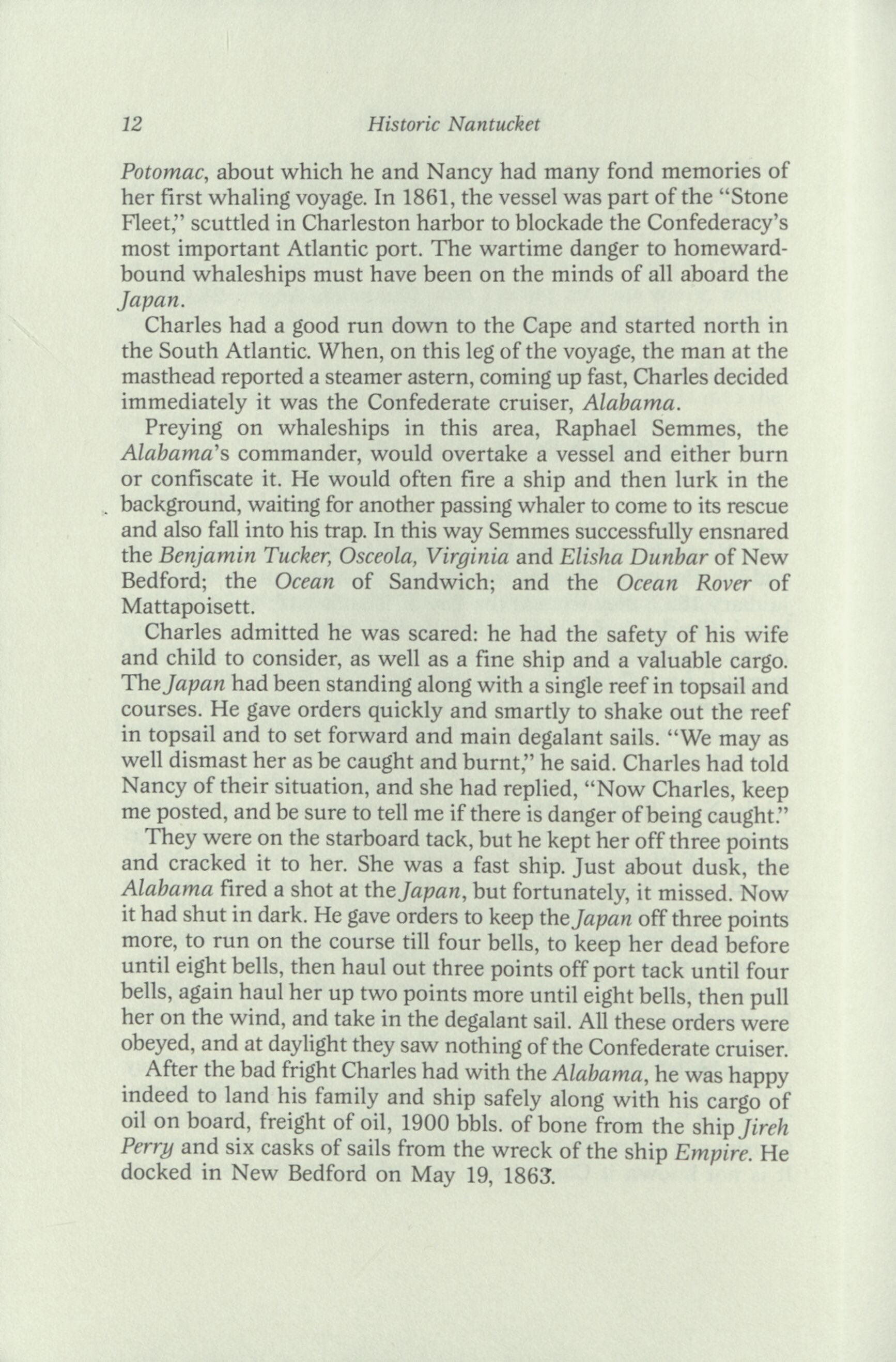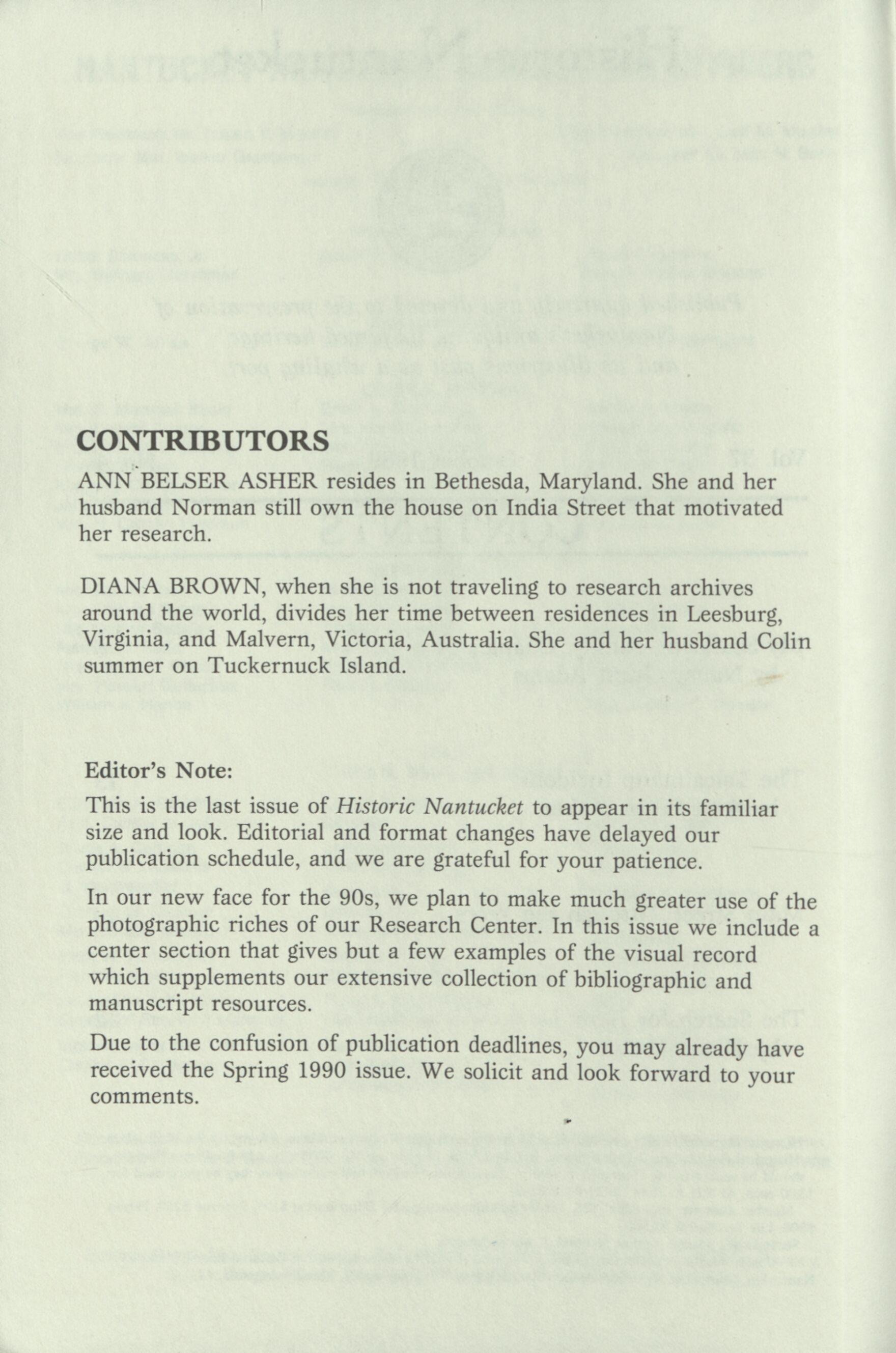
16 minute read
Vol. 37 October 1989 No
CONTRIBUTORS
ANN BELSER ASHER resides in Bethesda, Maryland. She and her husband Norman still own the house on India Street that motivated her research.
DIANA BROWN, when she is not traveling to research archives around the world, divides her time between residences in Leesburg, Virginia, and Malvern, Victoria, Australia. She and her husband Colin summer on Tuckernuck Island.
Editor's Note: This is the last issue of Historic Nantucket to appear in its familiar size and look. Editorial and format changes have delayed our publication schedule, and we are grateful for your patience. In our new face for the 90s, we plan to make much greater use of the photographic riches of our Research Center. In this issue we include a center section that gives but a few examples of the visual record which supplements our extensive collection of bibliographic and manuscript resources. Due to the confusion of publication deadlines, you may already have received the Spring 1990 issue. We solicit and look forward to your comments.
My Seafaring Family
by Nancy Grant Adams
5
Nancy Grant Adams wrote My Seafaring Family about thirty years ago. It has been published in Historic Nantucket at intervals since July 1953, when the first chapter appeared. With pride and pleasure we continue the story of her grandparents, Captain Charles and Nancy Grant. On his ninth voyage Charles commanded the New Bedford whaleship Japan and left Nancy on Nantucket with their three children for more than a year.
Chapter 14 The Ship Japan
"Lo! the unbounded sea! On its breast a ship starting, spreading all her sails -- an ample ship carrying even her moonsails; The pennant is flying aloft, as she speeds, she speeds so stately below, emulous waves press forward, They surround the ship, with shining curving motions, and foam." From Leaves of Grass by Walt Whitman
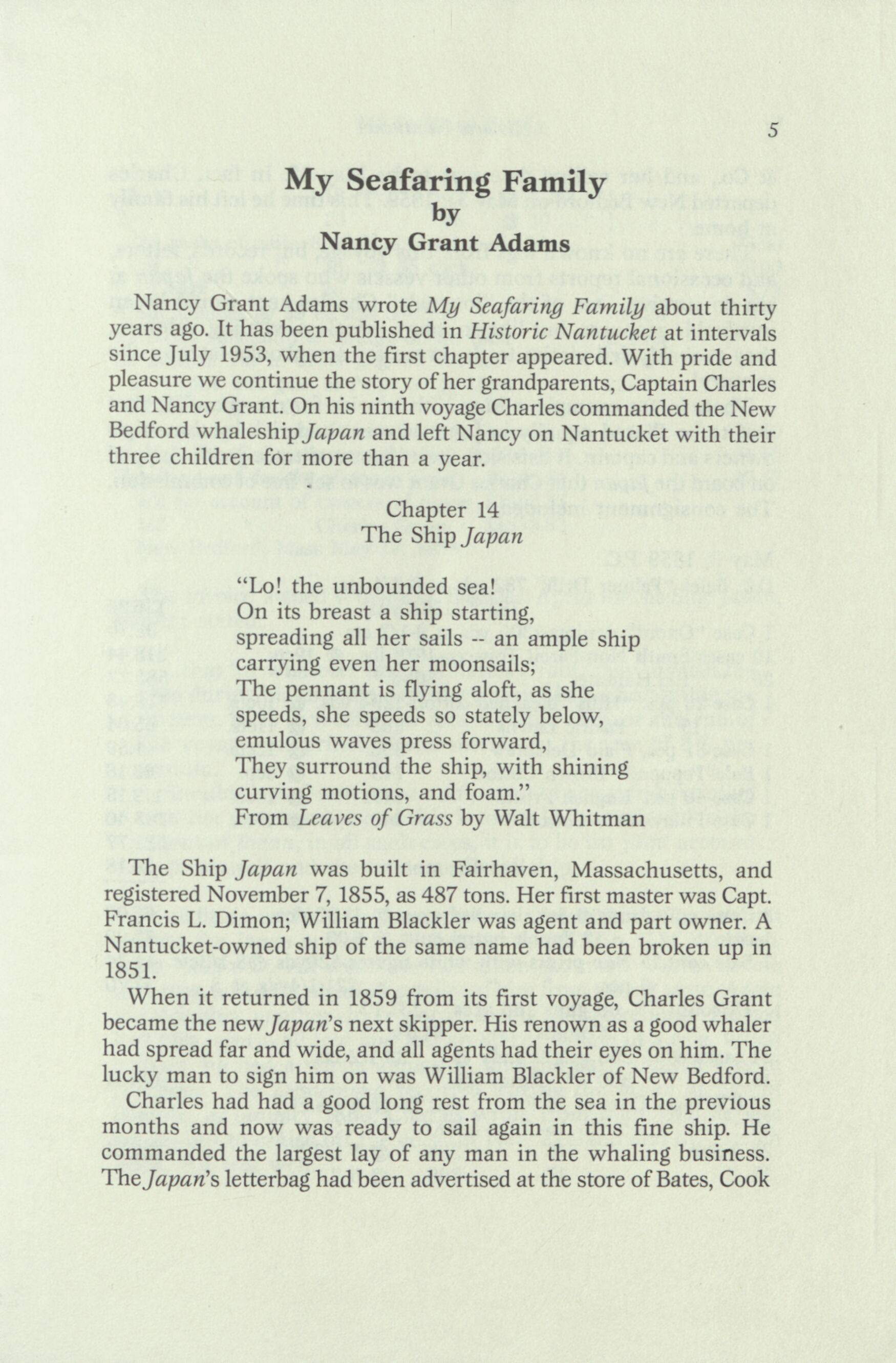
The Ship Japan was built in Fairhaven, Massachusetts, and registered November 7, 1855, as 487 tons. Her first master was Capt. Francis L. Dimon; William Blackler was agent and part owner. A Nantucket-owned ship of the same name had been broken up in 1851.
When it returned in 1859 from its first voyage, Charles Grant became the new Japan's next skipper. His renown as a good whaler had spread far and wide, and all agents had their eyes on him. The lucky man to sign him on was William Blackler of New Bedford.
Charles had had a good long rest from the sea in the previous months and now was ready to sail again in this fine ship. He commanded the largest lay of any man in the whaling business. The Japan's letterbag had been advertised at the store of Bates, Cook
6
Historic Nantucket
& Co., and her sailing date was to be May 15. In fact, Charles departed New Bedford on May 31, 1859. This time he left his family at home.
There are no known logs from this voyage, but records, letters, and occasional reports from other vessels who spoke the Japan at sea do survive. One of the "journals" Charles kept would be an invaluable resource, but like so many priceless whaling volumes, they probably fell victim to the craze for scrapbooks later in the century!
There is, for example, a May 17th invoice for merchandise that was to be shared equally in joint account and risk by the ship's owners and captain. It lists slop chest items and trade goods shipped on board the Japan that Charles Grant was to sell free of commission. The consignment included:
May 3, 1859 P.C. D.2. Bales "Palmer Drill" 782 yds at 8-3/4 cts 783 " [1565 yds]
136.94 1 Case "Oxord" denitns-1309 yds at 9-1/2 cts 98.70 10 cases Smith Non-Pareil Tobacco-1676 lbs. @ 19cts 318.44 26 " P.H.Hammet 3086 " " " 585.77 1 Case-26 pes. "Hills" bleached cotton-1294 yds. @ lOcts. 129.43 " 15 " Pacific Lawns 565 @ llcts. 65.04 1 Case-81 pes. Plaid Delaine's 332 @ 12cts. 41.59 1 Bale"Pepperel" Brown Cotton 743 @ 8cts. 63.16 1 Case-40 pes. English Prints 1191 @ lOcts 119.15 1 Case Pillow Case Cotton 940 @ llcts 103.40
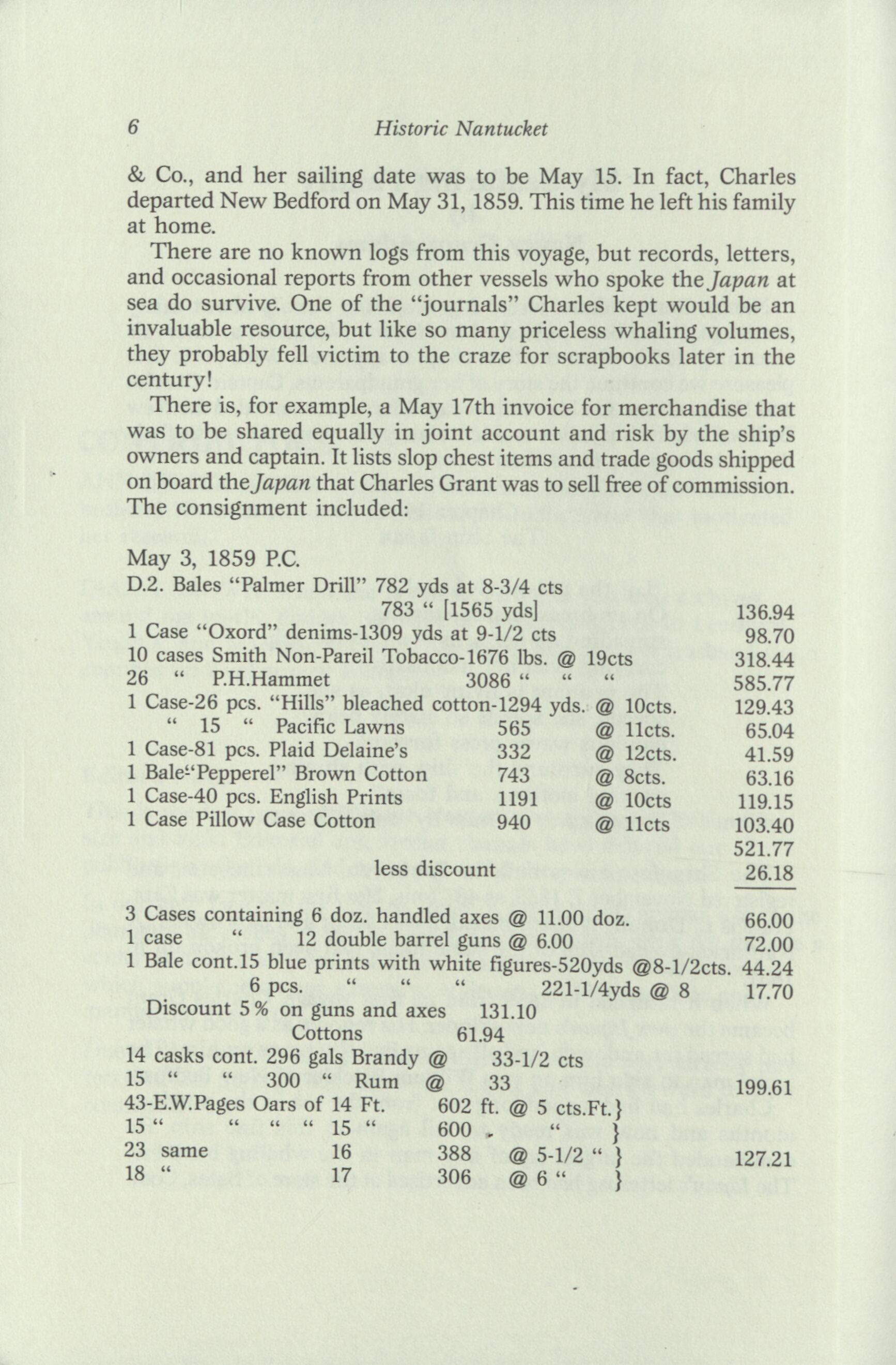
less discount 521.77 26.18
3 Cases containing 6 doz. handled axes @ 11.00 doz. 66.00 1 case " 12 double barrel guns @ 6.00 72.00 1 Bale cont.15 blue prints with white figures-520yds @8-l/2cts. 44.24 6 pes. " " " 221-l/4yds @ 8 17.70
Discount 5 % on guns and axes 131.10 Cottons 61.94 14 casks cont. 296 gals Brandy @ 33-1/2 cts 15 " " 300 " Rum @ 33 199.61 43-E.W.Pages Oar s o f 1 4 F t . 6 0 2 f t . @ 5 c t s F t } 15 " « « « 15 « 6oo „ « j 23 same 16 388 @ 5-1/2 " } 127 21 18 " 17 306 @ 6 " }
My Seafaring Family
7
19 " 18 342 @ 6-1/2 " }
2 23 46 @ 10 " } 20 casks of nails- 8 of 7d.-8 of 8d.-2 of 12d. 75.00
4 " " 3d. @ $5 each 1 cask 2d 20.00
5.75
4 Spy Glasses @ $9 ea.-less 59„ disc 34.20 25 boxes Adamantine candles-36 lbs each 274.00 28 Bbls. of Tar in casks @@98 cts. bbl 83.44 8 " cont. 320 gals, of Paint oil @ 70cts 224.00 8 bbls. " @ $1.00 8.00 2 cases cont. 100 prs. Patent Leather Shoes @ 1.25 125.00 15 kegs-21b. Cannisters powder-375 @ 22-1/2 84.40 Trucking "and freight of goods Total $3105.66 47.47 1/2 for account of owners of Japan $1552.83 1/2 " " Charles Grant $1552.83
New Bedford, Mass May 17, 1859
The invoice, signed William G. Blackler, Agent for the Ship Japan, further stated:
...that for whatever funds [Charles Grant] may furnish the ship during his absence, over the amount in his hands due the owners, he is to receive on return of the ship, or the end of the voyage, the principal and interest at the rate of 6 % per annum.
Should Capt. Grant make a shipment of any purchase of oil or other merchandise and ship it to the U.S. consigned to the Agent of Japan, in all such cases, it is to be for joint account with himself and the owners of said ship.
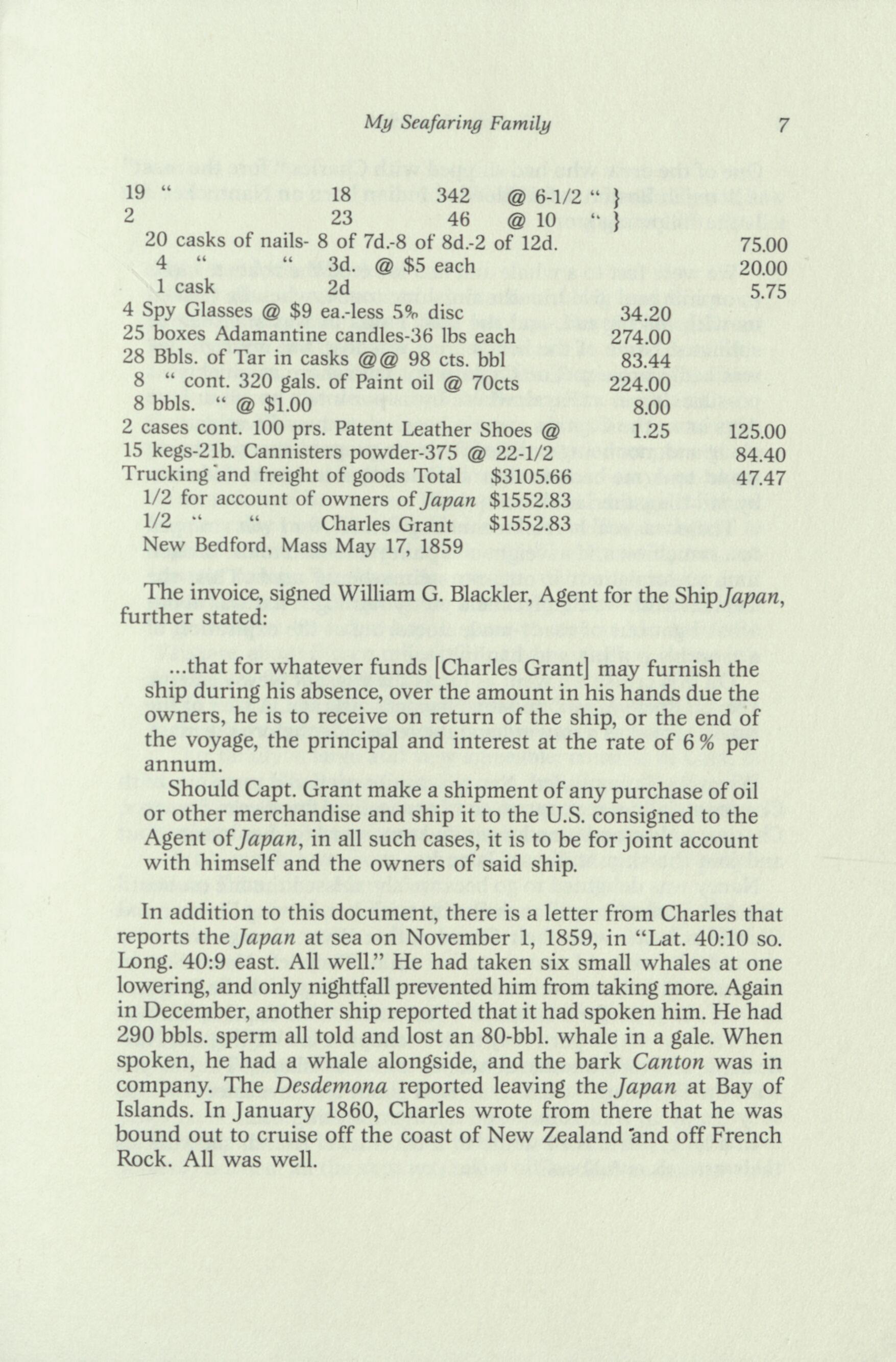
In addition to this document, there is a letter from Charles that reports the Japan at sea on November 1, 1859, in "Lat. 40:10 so. Long. 40:9 east. All well." He had taken six small whales at one lowering, and only nightfall prevented him from taking more. Again in December, another ship reported that it had spoken him. He had 290 bbls. sperm all told and lost an 80-bbl. whale in a gale. When spoken, he had a whale alongside, and the bark Canton was in company. The Desdemona reported leaving the Japan at Bay of Islands. In January 1860, Charles wrote from there that he was bound out to cruise off the coast of New Zealand and off French Rock. All was well.
8
Historic Nantucket
One of the crew who had shipped with Charles "'fore the mast" was Benajah Boston, a full-blooded Indian born on Nantucket. He tells the following story:
We were fast to a whale and had lowered the boats to close in on him and give him the finishing touch, when he frisked us with his big tail, and the boat I was in was smashed to splinters. None of the boat's crew was lost, but my right leg was badly broken. The Captain got me ashore as quickly as possible. It was at Fayal, where I was put into a hospital. Five days later, the Captain came ashore to see how I was getting along and, not being satisfied with the progress that was being made, took me back to ship, allowing that he could do better • by me than the landlubbers had.
There was real heroic treatment given me, for I was strapped to a stanchion and a weight and pulley attached to the broken limb to straighten it out, no splints being used. This, the
Captain said, would give me a pretty fair leg. That was about what I got out of ready-made doctoring at the expiration of a month's pulling and hauling.
On this cruise we went as far as the coast of New Zealand,
French Rock, Japan, and the Navigator Islands. A part of the time I served as a steward and the remainder before the mast.
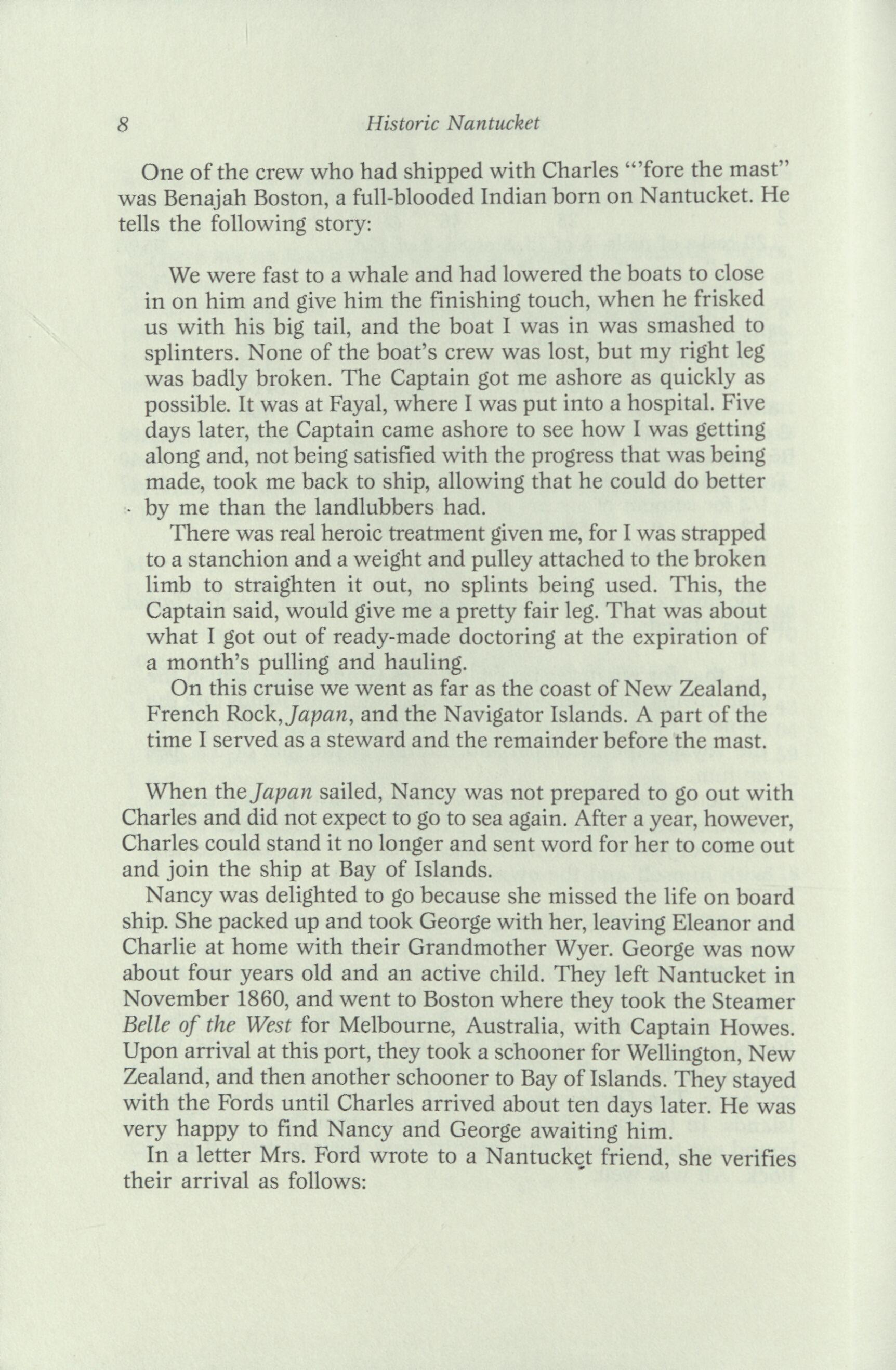
When the Japan sailed, Nancy was not prepared to go out with Charles and did not expect to go to sea again. After a year, however, Charles could stand it no longer and sent word for her to come out and join the ship at Bay of Islands.
Nancy was delighted to go because she missed the life on board ship. She packed up and took George with her, leaving Eleanor and Charlie at home with their Grandmother Wyer. George was now about four years old and an active child. They left Nantucket in November 1860, and went to Boston where they took the Steamer Belle of the West for Melbourne, Australia, with Captain Howes. Upon arrival at this port, they took a schooner for Wellington, New Zealand, and then another schooner to Bay of Islands. They stayed with the Fords until Charles arrived about ten days later. He was very happy to find Nancy and George awaiting him.
In a letter Mrs. Ford wrote to a Nantucket friend, she verifies their arrival as follows:
My Seafaring Family 9
Washington House, Russel[l]. January 20. 1861
My Dear Mrs. Winslow:
Very glad as we were to see our dear old friend Perry; we miss you very much and dear Johnny-- Brave Nancy Grant has arrived safely and is as magnificent as ever; dear little George Arthur is suffering severely with hooping cough, which he caught on the vessel from Melbourne to Auckland. Dear Mrs. Baker, our darling, is here waiting for a few months an anticipated blessing. Dear Ella, she is a sweet pet and we earnestly trust it will please God to give her an easy and happy termination of her hopes. We expect her Archangel Michael in every day now. The Goulds have left the Bay and gone to a place a few miles from Auckland. The Russells, too, are leaving today. We have at present neither minister nor schoolteacher in the place, so our darling Earnest (sic) who is growing to he a fine boy, is gone to stay at his Aunt's in Waimate, about fifteen miles off and be taught by his cousin's governess, for the present.
We have at last enlarged our house and I am writing to you in the bow window of my new room up stairs, fronting the sea.
Our family is large and very agreeable; consists of Capt. & Mrs. Grant, Ella Baker, Capt. Vincent Fish, Frank Worthy, and your lively Perry. He is obliged to keep up the steam to prevent fretting for his absent ones. Now I must say good-bye.
With much love from my own dear husband to you and yours, I am, dear Mary Ann, Your affectionate Bay of Island Sister, Martha Ford.
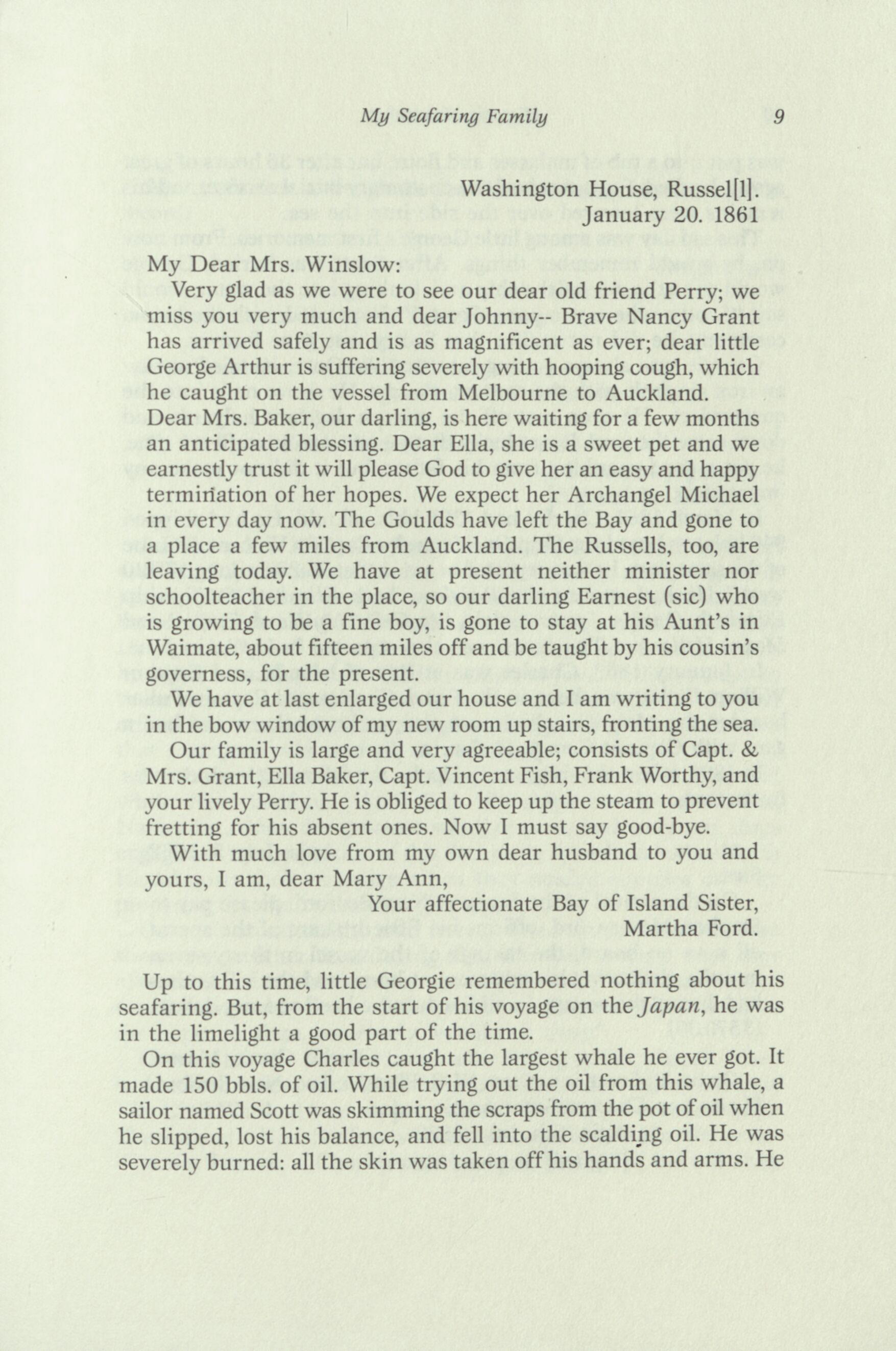
Up to this time, little Georgie remembered nothing about his seafaring. But, from the start of his voyage on the Japan, he was in the limelight a good part of the time.
On this voyage Charles caught the largest whale he ever got. It made 150 bbls. of oil. While trying out the oil from this whale, a sailor named Scott was skimming the scraps from the pot of oil when he slipped, lost his balance, and fell into the scalding oil. He was severely burned: all the skin was taken off his hands and arms. He
10 Historic Nantucket
was put into a tub of molasses and flour, but after 36 hours of great agony, he died. Scott received the customary burial service, and his remains were lowered over the side into the sea.
This sad day was among little George's first memories. From now on, he would remember things. After Scott was buried, George would go to the side of the ship and, looking into the water, would say, "Scotty, where you gone, Scotty?" Impressed with the burial ceremony, he did not realize that Scotty was gone forever.
Georgie was always getting into trouble. Once, he tried to saw an iron ringbolt with the carpenter's saw. He drove nails into the quarterdeck. He even cast off the mizzen degalant halyards and down came the yard. It was lucky that no one was on it. Every time, he got a good spanking from his father, but it did not make any impression.
In March 1861, Charles had 1325 bbls. all told. He had shipped 940 bbls. on hoard the Ship Oneida under Captain Vincent. In June of the same year, he was reported at sea in "lat 25:20 So. Iong.l75:20 west." He had spoken the Rainbow, bark Elizabeth Swift, ship Elizabeth, Oneida, James Arnold, Sea Gull, Gay Head, Empire and Mount Hollaston. The Japan was also reported in Upolu in June.
In January 1862, Charles was at Bay of Islands, and Captain William Fuller was there on the Petrel. Charles and Captain Fuller boarded the Mohawk, which was also anchored there, and had a gam with Captain George H. Swain.
In 1862, when the ship was in Upolu, the following business was transacted:
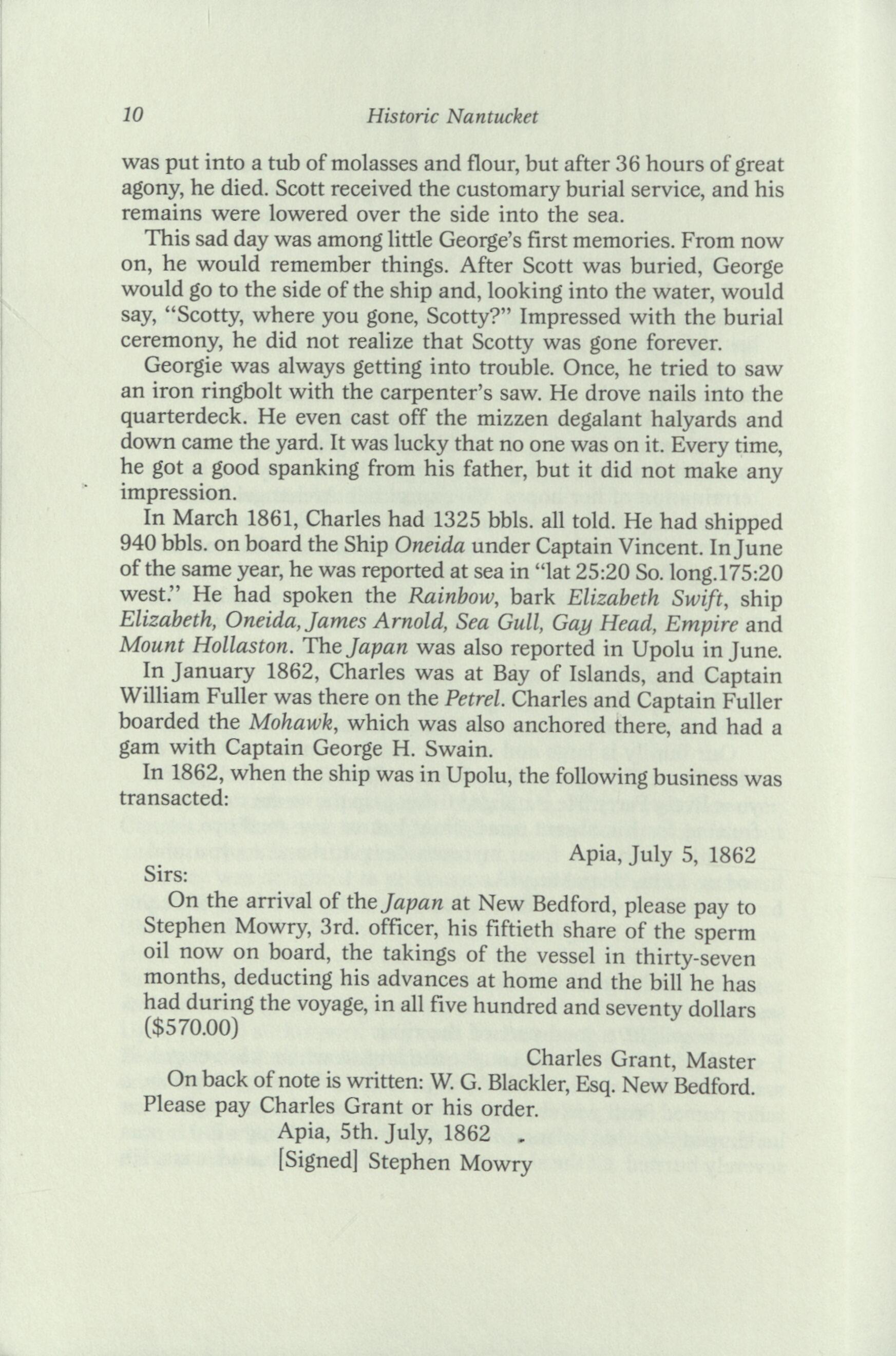
Apia, July 5, 1862 Sirs:
On the arrival of the Japan at New Bedford, please pay to Stephen Mowry, 3rd. officer, his fiftieth share of the sperm oil now on board, the takings of the vessel in thirty-seven months, deducting his advances at home and the bill he has had during the voyage, in all five hundred and seventy dollars ($570.00)
Charles Grant, Master
On back of note is written: W. G. Blackler, Esq. New Bedford. Please pay Charles Grant or his order. Apia, 5th. July, 1862 _ [Signed] Stephen Mowry
My Seafaring Family 11
About this time, although the year date is missing, there is another record:
Tongatabu Nukualofa-August 28, 18Captain Grant Dr-to the Tonga-Agency of Der Deutsche Handels & Plantagengesselschaft Der Sudsee-Anselm
To 55 lbs of Fresh Beef @ (about 16 cts.) Received payment. [Signed] H. Eicholes
In November 1862, the Japan was at Norfolk Island, lying off and on; Captain Swain of the Mohawk was also there. Again in January 1863, they were at the Bay of Islands with 1260 bbls. on board. Charles had 50 bbls. oil as freight from the wrecked ship Empire. At Russell any sick or injured could be taken to Dr. Ford's hospital, a small place he had attached to his dwelling house. In those days, Dr. Watling was the man who was called if surgical attendance was needed; but, rough as things were, it was not often that a surgeon was wanted, or could help.
By the early sixties, the whaling business was in decline; and while New Bedford (1862) had 198 ships on the active list, Nantucket, once the greatest whaling port, had only ten ships engaged. A fair proportion of this fleet made Russell and other North Island ports their objective when they needed supplies or were preparing for the homeward journey.
On such occasions the men were granted unrestricted leave on shore. At no other time during their four-year voyage were they allowed this favor because, as one skipper said, "If a ship cleared for Heaven and by force of circumstances was compelled to call at the opposite place, somebody would run away."
Charles left the Bay for home after fitting out at Russell. They had stowed below deck 2080 bbls. of sperm oil, a valuable cargo. The Civil War had been in progress for about nine months before Charles met a New Bedford ship whose captain told him the news. It is not known if Charles also learned the fate of his old ship,
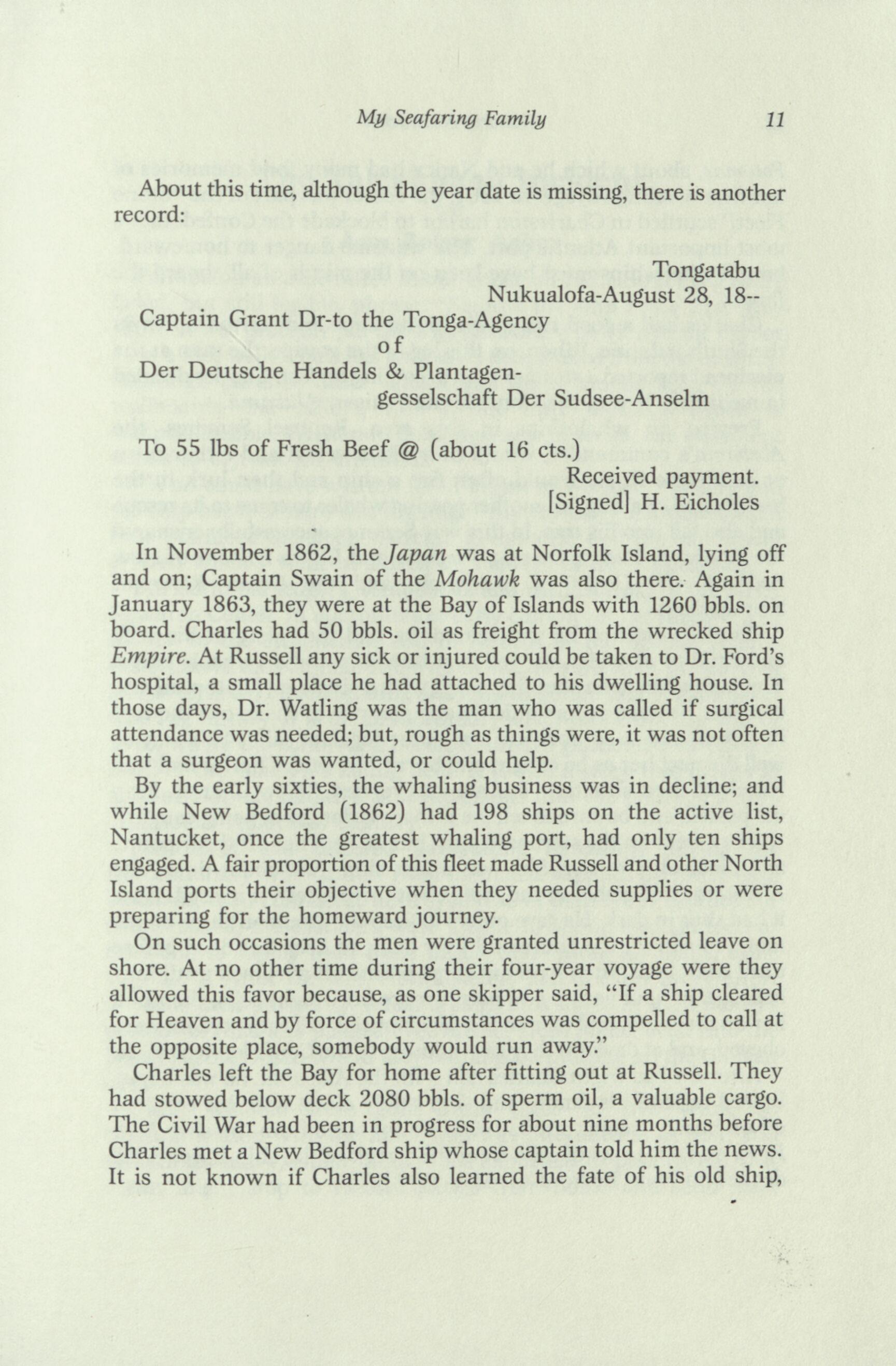
12 Historic Nantucket
Potomac, about which he and Nancy had many fond memories of her first whaling voyage. In 1861, the vessel was part of the "Stone Fleet," scuttled in Charleston harbor to blockade the Confederacy's most important Atlantic port. The wartime danger to homewardbound whaleships must have been on the minds of all aboard the Japan.
Charles had a good run down to the Cape and started north in the South Atlantic. When, on this leg of the voyage, the man at the masthead reported a steamer astern, coming up fast, Charles decided immediately it was the Confederate cruiser, Alabama.
Preying on whaleships in this area, Raphael Semmes, the Alabama's commander, would overtake a vessel and either burn or confiscate it. He would often fire a ship and then lurk in the background, waiting for another passing whaler to come to its rescue and also fall into his trap. In this way Semmes successfully ensnared the Benjamin Tucker, Osceola, Virginia and Elisha Dunbar of New Bedford; the Ocean of Sandwich; and the Ocean Rover of Mattapoisett.
Charles admitted he was scared: he had the safety of his wife and child to consider, as well as a fine ship and a valuable cargo. The Japan had been standing along with a single reef in topsail and courses. He gave orders quickly and smartly to shake out the reef in topsail and to set forward and main degalant sails. "We may as well dismast her as be caught and burnt," he said. Charles had told Nancy of their situation, and she had replied, "Now Charles, keep me posted, and be sure to tell me if there is danger of being caught."
They were on the starboard tack, but he kept her off three points and cracked it to her. She was a fast ship. Just about dusk, the Alabama fired a shot at the Japan, but fortunately, it missed. Now it had shut in dark. He gave orders to keep the Japan off three points more, to run on the course till four bells, to keep her dead before until eight bells, then haul out three points off port tack until four bells, again haul her up two points more until eight bells, then pull her on the wind, and take in the degalant sail. All these orders were obeyed, and at daylight they saw nothing of the Confederate cruiser.
After the bad fright Charles had with the Alabama, he was happy indeed to land his family and ship safely along with his cargo of oil on board, freight of oil, 1900 bbls. of bone from the ship Jireh Perry and six casks of sails from the wreck of the ship Empire. He docked in New Bedford on May 19, 1868.
